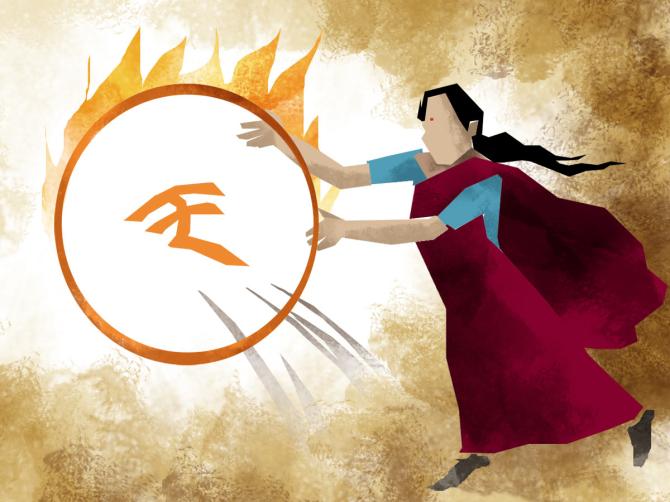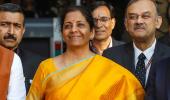The BJP would want that by March 2022, when UP votes, the economy starts looking up and it heads into the polls with no other issue distracting from its main poll plank of the construction of the Ram temple in Ayodhya.
Archis Mohan reports.

As is usual with the Budgets of the Narendra Modi government, the one that Finance Minister Nirmala Sitharaman tabled in Parliament on Monday has an eye set on the forthcoming assembly polls.
The Budget has allocated funds for road construction in four poll-bound states and a Union Territory -- Tamil Nadu, Kerala, West Bengal, Assam, and Puducherry -- and also for the welfare of tea garden workers in Bengal and Assam.
The Bharatiya Janata Party had swept the Lok Sabha seats in 2019 in north Bengal, home to tea gardens, and the party continues to remain popular there as well, as in Upper Assam.
The BJP would try retain Assam, and hopes to wrest Bengal from the ruling Trinamool Congress, but is expected to remain a marginal player in the other three. The polls are due in April-May.
While the BJP could still live with not forming a government in Bengal if it were to perform significantly better in terms of winning the number of seats, it could not afford to do poorly in the next round of assembly polls in early 2022, especially in Uttar Pradesh.
Losing UP, with farm protests now engulfing western UP that had been the bedrock of the BJP's success in the 2014 Lok Sabha polls, will have ramifications for the 2024 Lok Sabha polls.
This is why Finance Minister Nirmala Sitharaman could take courageous decisions, some of which could hurt the BJP politically, in this year's Budget to shore up government revenue for the farm sector to pave the way for schemes that can be announced in the run-up to the UP assembly election.
The Budget has sought to address the lockdown triggered economic decline -- some argue that the decline started with demonetisation in November 2016 -- by laying out a road map for increased infrastructure investments.
The Centre has also slashed allocations for several social welfare schemes, including for the Pradhan Mantri Kisan Samman Nidhi and the Mahatma Gandhi National Rural Employment Guarantee Scheme (MNREGS). The allocation for 'agriculture and allied activities' has also been also cut, a brave decision as farm protests rage on.
The statements by the PM and others notwithstanding, the Budget numbers show the Centre is willing to risk political capital by increasing excise on nearly two dozen other items under agriculture cess.
States are up in arms with the Budget proposing hikes in petrol and diesel prices under the agricultural cess, which they say will eat into their share of excise.
The government has also come across as willing to face the flak on disinvestment of PSUs, including monetising government land. After the finance minister speech, the Opposition and also the Bharatiya Mazdoor Sangh, the trade union arm of the Rashtriya Swayamsevak Sangh, have criticised the government for selling the family silver.
It would not be politically feasible to take several of these steps in the next Budget. The 2022-23 Budget will not only be the penultimate of the current tenure of the government, but also be presented a couple of weeks before the UP assembly polls next year.
In 2017, the Centre had advanced the Budget presentation date from February 28 to February 1, and the UP assembly polls kicked off from February 11. It was then accused of changing the date for the purpose of influencing the polls.
The BJP government has, at least since 2016, avoided announcing electorally contentious proposals in its Budgets, but this Budget has departed from that pattern.
Smarting from its defeats in Delhi and Bihar in 2015, the BJP had jettisoned its promise of reform, the leitmotif of the PM's 2014 Lok Sabha campaign, and had turned to 'garib kalyan' in 2016.
The Centre launched such schemes as the Ujjwala Yojana from then to the run-up to the UP polls in 2017. But this year's Budget has seemingly called a halt, possibly temporary, to announcing new schemes either for agriculture or the social welfare sector.
In another turnaround, the Budget has approved increasing FDI in the insurance sector to 74 per cent, something the BJP had opposed when it was in the Opposition.
The BJP would hope to mop up enough revenue through agriculture cess to purchase farm produce of at least western UP in the two to three crop cycles that remain until the run-up to the assembly polls.
Apart from UP, the assembly polls will take place in Punjab, Uttarakhand, Goa, and Manipur in early 2022.
The BJP would want that by March 2022, when UP votes, the economy starts looking up and it heads into the polls with no other issue distracting from its main poll plank of the construction of the Ram temple in Ayodhya.
The government has faced strident criticism over jobs, or the lack of it, after demonetisation. The Budget has said over 140,000 jobs are estimated to be created between March 2019 and March 2021 in various central government departments.
The strength of government establishments was 3,271,113 as on March 1, 2019, which is estimated to increase to 3,414,226 by the first day of next month, it said.
The Budget documents have given a break-up of the jobs estimated to be created in central government departments between 2019 and March 2021. However, announcements for filling vacancies made in the run-up to the 2019 Lok Sabha polls, and even after that, are yet to materialise.











